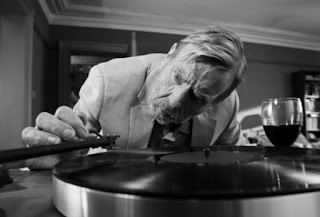Janet (played by Kristin Scott Thomas) has been supported in her idealistic climb up the greasy political pole by her academic husband Bill (Timothy Spall). She’s arranged a dinner party with some close friends to celebrate her promotion to Shadow Health Secretary. The Party proves to be a night of beginnings and endings, but mostly endings.
Brutally honest April (Patricia Clarkson) arrives with her soon to be ex-boyfriend, healer and life coach Gottfried (Bruno Ganz) who dispenses aphorisms with irritating regularity. Jinny (Emily Mortimer) bursts in with news for her older partner Martha (Cherry Jones). Tom (Cillian Murphy) arrives and makes excuses for his delayed wife. He’s het up, tooled up, agitated, and turns out not to the only one ‘doing a line’ in the house.
Played out in real time over seventy one minutes in black and white, the lack of colour accentuates audience focus on the dialogue and people’s facial expressions as the entrée explodes. While the mood is already collapsing like a soufflé that has been checked on in the oven once too often, Bill’s revelation about his health – which explains his mournful drink-infused jazz-laden lethargy – is the fatal blow that pushes the evening into the catastrophe curve from which it surely cannot escape.
Despite an evening of cooking and the excitement that follows, Janet’s white blouse remains unblemished. Secrets are served up instead of food. Her own secret remains tucked away like her cheeping mobile – was that a Blackberry? – unlike everyone else in the house. Timothy Spall switches from being docile to animated, encouraged by Gottfried’s crazy mix of philosophy and dogma. His second revelation is one of the least signposted aspects of the plot. Kristin Scott Thomas pivots from celebration to concern to lashing out as her already complicated world overheats. Emily Mortimer’s naïve portrayal of pregnant Jinny enjoyable until the moment she too disappoints and outs her over-feminist doctrine.
Given how little the friendship circle actually understand the lives of each other, Janet couldn’t have invited a worse group of people over to toast her success.
Sticking to black and white has not limited writer/director Sally Potter’s ambition to old-fashioned methods of story telling. The handheld camera is allowed to wobble, explore low angles and cut off people’s heads if they move through the shot too quickly. The varied pace of the editing keeps the story moving despite being trapped in the ground floor of the house. Scenes flit between conversations and locations, yet are allowed to linger without dialogue when it fits the moment. Laughter roars out from the audience at the fraught situations and bizarre things people say when they are tense.
Hypocrisy abounds. Long held understandings are stressed and fractured. The film finishes before the evening is over. No one’s situation is fully resolved and much is left hanging at the end. It’s an incredibly satisfying manner in which to fade to black (with the exception of seeing the last shot right at the beginning minus the dialogue which ever so slightly tarnishes the symmetry).
The often unseen cost of ambition and people’s struggle to adequately live out their feelings of loyalty are explored. The presence of a weapon is transformational in a confined and emotional vortex.
I feared that this film would really be a play. It is and it isn’t.
Sally Potter very effectively exploits the grammar of film while retaining the intensity of a stage production. The camerawork makes it into a film, but The Party could – and perhaps, should – transfer to a theatre stage with relatively few changes.
If it had been staged in a theatre I might have had more space to unpack the universal messages of social conflict and political pressures, but on the silver screen it still worked as a mature and well formed piece of storytelling.
I often wonder what Dennis Potter would have made of Brexit, the Scottish independence referendum and the DUP propping up the Tory government? I imagine if he was still writing plays and TV series, his imagination and scathing pen would have eviscerated any sense of complacency with a treatise that lampooned the heightened feelings of nationalism and gung-ho politics of today.
Sally Potter is no relation!
This script and this film demonstrate a much less flamboyant style than her namesake. Yet she displays a very familiar deft touch of pushing a character and the story further than is comfortable to better transmit the message that is squarely on her mind.
The Party is quite a treat and a great piece of storytelling. It runs in Queen’s Film Theatre until Thursday 2 November. Far better than The Snowman, Geostorm or Blade Runner 2049!






No comments:
Post a Comment